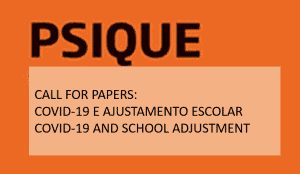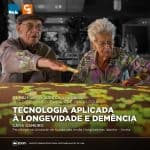- Akca, AYE, Martins, AT, Brazzoni, L., Jimenez-Ros, A.. M., Di Girolamo, M., Barbosa, F., & Zennaro, A. (2023). The association of the dark tetrad with the ability to feign schizophrenia. Psychology & Neuroscience, 16(3), 302–315. https://doi.org/10.1037/pne0000323 (Scimago 2023: Q3/ Neuropsychology ans Physiological Psychology)
- Almiro, P.A.., Marques, PF, Duarte, MC, Alberto, IM, & Simões, MR (2023). Validation study of the Roberts Apperception Test for Children (RATC) in an adolescents' forensic sample. Acta Psychologica, 235, 103900. https://doi.org/10.1016/j.actpsy.2023.103900 (Scimago 2022: Q2/ Developmental and educational psychology)
- Andrade, L., Santos, C. & Faria., L., (2023). The mediating effect of job satisfaction on the relationship between perceived overqualification, turnover intention and job performance among call center employees. Polish Psychological Bulletin, 54(4) 262–271.https://doi.org/10.24425/ppb.2023 (Scimago 2023: Q3/ Psychology, miscellaneous)
- Brandao, T. Brites, R., Hipólito, J., Nunes, O., & Pires, C. (2023). Emotion regulation in dementia caregiving: The role of neuropsychiatric symptoms and attachment orientation. Journal of Geriatric Psychiatry and Neurology (Scimago 2022: Q2/ Psychiatry and Mental health)
- Brandao, T. Brites, R., Hipólito, J., & Nunes, O.. (2023). Attachment orientations, emotion goals, and emotion regulation. Personality and Individual Differences, 204, 112059. http://dx.doi.org/10.1016/j.paid.2022.112059 (Scimago 2022: Q2/ Psychiatry and Mental health)
- Brandao, T. Brites, R., Hipólito, J., & Nunes, O.. (2023). Emotion goals, emotion regulation, and mental health: a mediational hypothesis. Clinical Psychologist. https://doi.org/10.1080/13284207.2023.2214312. (Scimago 2022: Q3/ Clinical Psychology)
- Brás, M., Elias, P., Cunha, F. F., Martins, C., Nunes, W., & Carmo, C. (2023). Vulnerability to suicide ideation: comparative study between adolescents with and without psychosocial risk. Healthcare, 11(19), 2663. https://doi.org/10.3390/healthcare11192663 (Scimago 2023: Q2/ Health Policy)
- Brites, R., Paulino, M., Brissos, S., Gabriel, S., Alho, L., Simões, MR, & Silva, CF (2023). Initial Psychological Reactions to COVID-19 of Middle Adolescents in Portugal. International Journal of Environmental Research and Public Health, 20, 5705. https://doi.org/10.3390/ijerph20095705 (Scimago 2022: Q2/ Public health, environmental and occupational health)
- Corte-Real, A., Almiro, P.A.., Silva, M., Nunes, T., Abreu, J., Carreira, C., & Vieira, D. (2023, in press). Oral health professional intervention and child physical abuse – European legal approach. Forensic Sciences Research, 8(4), 321-327. https://doi.org/10.1093/fsr/owad042 (Scimago 2022: Q2/ Psychiatry and mental health)
- Cunha, A., Carmo, C., & Brás, M. (2023). Psychological risk and protective factors for suicidal ideation: A study in an adolescent sample in an island context. J Korean Acad Child Adolesc Psychiatry, 34(4), 250-257. https://doi.org/10.5765/jkacap.230031 (Scimago 2023: Q3/ Psychiatry and Mental Health)
- Figueiredo, S. (2023, in press). Receiver Operating Characteristic analysis: sensitivity and specificity indexes for argument-based validity of new Second Language testing tools. International Journal of Psychology. (Scimago 2022: Q1/ Psychology, Medicine, Arts and Humanities)
- Figueiredo, S. (2023). Bullying and victimization in schools: Causal relationship between adolescent disruptive behavior, sleep schedules, and extended school hours. Psychology in the Schools. http://dx.doi.org/10.1002/pits.23029 (Scimago 2022: Q2/ Developmental and Educational Pychology, Q1/Education)
- Figueiredo, S. (2023). Chronotypes, disruptive behavior, and schedules in classrooms: “morningness” and psychomotor agitation. Center for Education Policy Studies Journal. https://doi.org/10.26529/cepsj.1454 (Scimago 2022: Q3/ Education)
- Figueiredo, S. (2023). The efficiency of tailored systems for language education: An App based on scientific evidence and for student-centered approach. European Journal of Educational Research, 12(2), 583-592. https://doi.org/10.12973/eu-jer.12.2.583 (Scimago 2022: Q3/ Education)
- Figueiredo, S. (2023). The effect of mobile-assisted learning in real language attainment: A systematic review. Journal of Computer Assisted Learning, 1-20. https://doi.org/10.1111/jcal.12811 (Scimago 2022: Q1/ Education)
- Figueiredo, S., & Gomes, AM (2023, accepted). Educational and Psychological Implications of Sleep Habits and Technology Usage: inattention and controlled behaviors. Journal for ReAttach Therapy and Developmental Diversities. (Scimago 2022: Q4/ Developmental and Educational Psychology, Clinical Psychology)
- Figueiredo, S., & Madureira, R. (2023, in press). Predictors for bullying in adolescents: a structural equation modeling analysis. SAGE OPEN. (Scimago 2022: Q2/ Social Sciences, Arts and Humanities)
- Chicken, I., Oishi, S., Wirtz, D., & Pereira, C. (2023). Personal Values and Life Domains Satisfaction Differently Predict Global Subjective Well-Being Across Cultures: American, Mozambican and Portuguese. Journal of Personal and Social Relationships. http://doi.org.10.1177/02654075231173157 (Scimago 2022: Q1/ Social Psychology, Developmental and Educational Psychology)
- Galinha, SA & Goncalves, G. (2023). Psychometric qualities of the GDS-15 during the Covid19 pandemic. Lusófona Education Magazine, 57(57), 25-41. https://doi.org/10.24140/issn.1645-7250.rle57.02 (Scimago 2023: Q4/ Education)
- Goncalves, G., Sousa, C., Fernandes, J., Almeida, N., & Sousa, A. (2023). Restorative effects of biophilic workplace and nature exposure during working time: A systematic review. International Journal of Environmental Research and Public Health, 20(21), 6986. https://doi.org/10.3390/ijerph20216986. (Scimago 2023: Q2/ Public Health, Environmental and Occupational Health)
- Goncalves, G., AL-Dossary, SA, & Sousa, C. (2023). Measurement invariance and country differences in death anxiety: Evidence from Portuguese and Arabic samples. Current Psychology. https://doi.org/10.1007/s12144-023-04659-1 (Scimago 2023: Q1/ Psychology (miscellaneous))
- Goncalves, G., Sousa, C., & Arasaratnam-Smith, L. (2023). The effect of multicultural attitudes and perceived intergroup threat on attitudes towards immigrants in Portugal: A polynomial regression with response surface analysis. Psychological Reports, 0(0).
https://doi.org/10.1177/00332941221149182 (Scimago 2023: Q2/ Psychology (miscellaneous))
- Gonçalves, SP, Vieira dos Santos, J.., & Silva, I. (2023). Effects of COVID-19 on the mental health of university students. PSYCHOLOGY, 37(1), 20–29. (Scimago 2023: Q4/ Psychology (miscellaneous))
- Guerreiro, M., Faísca, L., Brás, M., & Carmo, C. (2023). A test of the 2 × 2 model of perfectionism with perceived distress, cognitive emotion regulation, and perfectionist cognitions. Current Psychology. https://doi.org/10.1007/s12144-023-05388-1 (Scimago 2023: Q1/ Psychology (miscellaneous))
- Iacob, V., Jesus, SN, & Carmo, C. (accepted, 2023). An overview of mindfulness theories applied to tourism: systematic review update and bibliometric analysis. Quality & Quantity.
- Iacob, V., Jesus, SN, & Carmo, C. (accepted, 2023). Validation and psychometric properties of the Portuguese version of the Freiburg Mindfulness Inventory (FMI). mindfulness.
- Kulari, G., & Cordeiro, SF (2023). Autism diagnosis experience and parental stress among Portuguese parents. Advances in Autism (ahead-of-print) https://doi.org/10.1108/AIA-08-2023-0046 (Scimago 2022: Q3/ Psychiatry and mental Health; Q3/ Developmental and Educational Psychology)
- Kulari, G., Laneiro, T., Ribeiro, L., Leiter, M., & Fernandes-dos-Santos, M. (2023). Relationship between authentic leadership and burnout: the mediating role of civility in healthcare sector in Portugal. Management Research: The Journal of the Iberoamerican Academy of Management, 21(3), 265-283. http://dx.doi.org/10.1108/mrjiam-03-2023-1391 (Scimago 2022: Q2/ Business and International Management, Strategy and Management)
- Laneiro, T., Ribeiro, L., Nitzsche, M., Ferraro, T., Kulari, G.., & Leiter, M. (2023).Straightforward incivility scale: adaptation and validation of workplace incivility measurement for Portuguese samples. Psyche, XIX(2), 86-105. https://doi.org/10.26619/2183-4806.XIX.2.5
- Leiria, MS, & Nunes, C. (2023). Children's Involvement in the Justice System – a Systematic Review. International Journal of Children's Rights, 31(3), 624–658. https://doi.org/10.1163/15718182-31030004 (Scimago 2023: Q2/ Social Sciences, miscellaneous)
- Mansutti, I., Tome-Pires, C., & Palese, A. (2023) Facilitating pain assessment and communication in people with disabilities: a systematic review. BMC Public Health, 23: 1594. https://doi.org/10.1186/s12889-023-16535-5 (Scimago 2022: Q1/ Public Health, Environmental and Occupational Health)
- Marks, H. Brites, R., Nunes, O., Hipólito, J., & Brandao, T. (2023). Attachment, emotion regulation, and burnout among university students: A mediational hypothesis. Educational Psychology. https://doi.org/10.1080/01443410.2023.2212889. (Scimago 2022: Q1/ Developmental and Educational Psychology)
- Marques-Costa, C., Simões, MR, Almiro, P.A.., Prieto, G., & Pinho, MS (2023). Integrating technology in neuropsychological assessment: a narrative review of the main obstacles, new developments, and potential issues in assessment through tablets. European Psychologist, 28(1), 1–11. https://doi.org/10.1027/1016-9040/a000484 (Scimago 2022: Q1/ Psychology, miscellaneous)
- Martins, C., Jesus, S. N., Silva, J., Nunes, C., & Ribeiro, C. (2023). The Volunteer Satisfaction Survey (VSS): Adaptation and Psychometric Properties Among Portuguese Volunteers. European Journal of Investigation in Health, Psychology and Education (EJIHPE), 13, 23- 32. https://doi.org/10.3390/ejihpe13010002 (Scimago 2023: Q2/ Applied Psychology, Clinical Psychology, Developmental and Educational Psychology)
- Martins, C., Jesus, Silva, Ribeiro, C., M. Estêvão, D., Mocho, H., Ratinho, E., & Nunes, C. (2023). The Volunteer Motivation Scale (VMS): Adaptation and Psychometric Properties among a Portuguese Sample of Volunteers. Sustainability, 16(1), 327–327.
https://doi.org/10.3390/su16010327 (Scimago 2023: Q2/ Management, Monitoring, Policy and Law)
- Mateus, AM, Heinzelmann, FL, Brites, R., Brandão, T., Nunes, O., & Hipólito, J. (2023). Emotional regulation, coping strategies and burden of informal caregivers of people with dementia. Psyche, XIX(2), 54-73.https://doi.org/10.26619/2183-4806.XIX.2.3
- Mourao, S., Pinheiro, S., Mendes, MM, Caetano, P., & Magano, O. (2023). How did the COVID-19 pandemic and digital divide impact Gypsies/Rome school pathways? Social Sciences, 12(2), 86. http://dx.doi.org/10.3390/socsci12020086 (Scimago 2022: Q2/ Social Sciences, miscellaneous)
- Neves, J. Giger, JC, Alves, V., & Soares, N. (2023). Focusing on Social Behaviors: Improving the Perceived Warmth of Sharks in an Aquarium Setting. Animals, 13(15), 2455. (online). https://doi.org/10.3390/ani13152455 (Scimago 2023: Q1/ Veterinary, miscellaneous)
- Neves, J, & Giger, JC. (2023). On crocodiles and turtles. Stereotypes, emotional tendencies and implications for conservation. Human Dimensions of Wildlife, 1-20. (online) https://doi.org/10.1080/10871209.2022.2146815. (Scimago 2023: Q2/ Management, Monitoring, Policy and Law)
- Nunes, C., Ayala-Nunes, L., Ferreira, LI, Pechorro, P., Freitas, D., Martins, C., & Santos, R. (2023). Parenting Sense of Competence: Psychometrics and Invariance among a Community and an At-Risk Samples of Portuguese Parents. Healthcare, 11(1), 15. https://doi.org/10.3390/healthcare11010015(Scimago 2023: Q2/ Health Policy)
- Pechorro, P., Bonfá-Araujo, B., Simões, M.R., Nunes, C., & DeLisi, M. (2023). Propensity to Morally Disengage Scale: Psychometric Properties and Measurement Invariance Among a Portuguese Sample. Deviant Behavior.
https://doi.org/10.1080/01639625.2023.2280926(Scimago 2023: Q2/ Clinical Psychology, Social Psychology)
- Pechorro, P. Nunes, C., Paulino, M., & Simões, M. (2023). Psychometric analysis of the defensiveness and validity scales of the Weinberger Adjustment Inventory. Revista Iberoamericana de Diagnóstico y Evaluación Psicológica. https://doi.org/10.21865/RIDEP67.1.04 (Scimago 2022: Q3/ Psychology, miscellaneous)
- Pechorro, P., DeLisi, M., Freitas, A., Gonçalves, RA, & Nunes, C. (2023). Examination of the Weinberger Adjustment Inventory—Short Form Among Portuguese Young Adults: Psychometrics and Measurement Invariance. International Journal of Offender Therapy and Comparative Criminology, 67(8), 803-821. https://doi.org/10.1177/0306624X211066838(Scimago 2022: Q3/ Applied Psychology)
- Rambla, C., Aragonès, A, Palleja-Millán, M., Tome-Pires, C.., López-Cortacans, G., Sánchez-Rodríguez, E., Miró, J. (2023). Short and long term predictors of pain severity and interference in primary care patients with chronic musculoskeletal pain and depression. BMC Musculoskeletal Disorders, 24: 270. https://doi.org/10.1186/s12891-023-06357-2 (Scimago 2022: Q2/ Rheumatology)
- Mouse, E., & Martins, C. (2023). The role of gamified learning strategies in student's motivation in high school and higher education: A systematic review. Heliyon, 9(8), e19033. https://doi.org/10.1016/j.heliyon.2023.e19033 (Scimago 2023: Q1/ Multidisciplinary)
- Rocha, B., Ferreira IL, Martins, C., Santos, R., & Nunes, C. (2023). The Dark Side of Multimedia Devices: Negative Consequences for Socioemotional Development in Early Childhood. Children, 10(11), 1807. https://doi.org/10.3390/children10111807 (Scimago 2023: Q2/ Pediatrics, Perinatology and Child Health)
- Sangreman, C. Magalhães, J. and Faria, R. (2023). National social identity in Guinea-Bissau: An exploratory essay inspired by the methodology of J.Cheek, S.Briggs, S.Smith and L.Tropp. Advances in Social Sciences Research Journal, 10(5), 148-171.http://dx.doi.org/10.14738/assrj.105.14726
- Scheibe, VM, Brenner, AM, Souza, GR, Menegol, R., Almiro, P.A.., & Rocha, NS (2023). The Eysenck Personality Questionnaire Revised – Abbreviated (EPQR-A): Psychometric properties of the Brazilian Portuguese version. Trends in Psychiatry and Psychotherapy, 45, e20210342. https://dx.doi.org/10.47626/2237-6089-2021-0342 (Scimago 2022: Q3/ Psychiatry and mental health)
- Severino, A., J.iménez-Ros, A., Brás, M., Carmo, C., Ferreira, LI, & January, L. (2023). The role of working memory as a moderator of implicit associations in young adults' alcohol use. Journal of Substance Use. https://doi.org/10.1080/14659891.2023.2278516 (Scimago 2023: Q3/ Health, Social Science)
- Soares, A., Piçarra, N., Giger, JC, Oliveira, R. & Arriaga, P. (2023). Ethics 4.0: Ethical Dilemmas in Healthcare Mediated by Social Robots. International Journal of Social Robotics, 15, 807-823. https://doi.org/10.1007/s12369-023-00983-5 (Scimago 2023: Q1/ Social Psychology)
- Tome-Pires, C.., Aragonès, E., Rambla, C., López-Cortacans, G., Sánchez-Rodriguez, E., -Caballero, A., & Miró, J. (2023). Perceived barriers, facilitators and usefulness of a psychoeducational intervention for individuals with chronic musculoskeletal pain and depression in primary care. Frontiers in Psychology, 14:1099419. https://doi/org/10.3389/fpsyg.2023.109 9419 (Scimago 2022: Q2/ Psychology, miscellaneous)
- Vaz, AM, Ferreira, LI, Gelso, C., & January, L. (2023). The sister concepts of working alliance and real relationship: A meta-analysis. Counseling Psychology Quarterly. https://doi.org/10.1080/09515070.2023.2205103. (Scimago 2023: Q1/ Clinical Psychology)
- Viana, J.P., Gonçalves, S., Brandão, C., Veloso, A., Vieira dos Santos, J.. (2023). The Challenges Faced by Higher Education Students and Their Expectations During COVID-19 in Portugal. Education Sciences, 13(4), 372, 1-18. https://doi.org/10.3390/educsci13040372 (Scimago 2023: Q2/ Education, Developmental and Educational Psychology)
- Vieira dos Santos, J., Gomes, A., Rebelo, D., Lopes, L., Moreira, M., & Silva, D. (2023). The consequences of job crafting and engagement in the relationship between passion for work and individual performance Portuguese workers. Frontiers in Psychology – Organizational Psychology section, 14, 1-19. https://doi.org/10.3389/fpsyg.2023.1180239 (Scimago 2023: Q2/ Psychology, miscellaneous)




